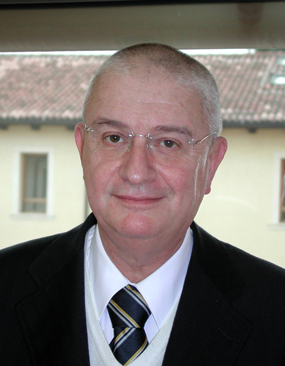Studying at the University of Verona
Here you can find information on the organisational aspects of the Programme, lecture timetables, learning activities and useful contact details for your time at the University, from enrolment to graduation.
Academic calendar
The academic calendar shows the deadlines and scheduled events that are relevant to students, teaching and technical-administrative staff of the University. Public holidays and University closures are also indicated. The academic year normally begins on 1 October each year and ends on 30 September of the following year.
Course calendar
The Academic Calendar sets out the degree programme lecture and exam timetables, as well as the relevant university closure dates..
| Period | From | To |
|---|---|---|
| 1° periodo di lezioni | Oct 3, 2016 | Dec 16, 2016 |
| Periodo riservato ad eventuali recuperi di lezioni - dicembre 2016 | Dec 17, 2016 | Dec 20, 2016 |
| 2° periodo di lezioni - febbraio/aprile 2017 | Feb 10, 2017 | Apr 10, 2017 |
| 2° periodo di lezioni - aprile/maggio 2017 | Apr 19, 2017 | May 9, 2017 |
| Periodo riservato ad eventuali recuperi di lezioni - maggio 2017 | May 10, 2017 | May 11, 2017 |
| Session | From | To |
|---|---|---|
| Sessione straordinaria 16/17 - studenti f.c. - dicembre 2016 | Dec 21, 2016 | Dec 23, 2016 |
| 1° appello - Sessione invernale 16/17 | Jan 10, 2017 | Jan 19, 2017 |
| 2° appello - Sessione invernale 16/17 | Jan 30, 2017 | Feb 8, 2017 |
| Sessione straordinaria 16/17 - studenti f.c. - aprile 2017 | Apr 11, 2017 | Apr 13, 2017 |
| 1° appello - Sessione estiva 16/17 | May 12, 2017 | May 22, 2017 |
| 2° appello - Sessione estiva 16/17 | Jun 8, 2017 | Jun 17, 2017 |
| 3° appello - Sessione estiva 16/17 | Jul 6, 2017 | Jul 15, 2017 |
| 1° appello - Sessione autunnale 16/17 | Aug 28, 2017 | Sep 6, 2017 |
| 2° appello - Sessione autunnale 16/17 | Sep 21, 2017 | Sep 30, 2017 |
| Session | From | To |
|---|---|---|
| Termine presentazione tesi di laurea - ottobre 2016 | Sep 23, 2016 | Sep 23, 2016 |
| Sessione autunnale - 15/16 | Oct 24, 2016 | Oct 25, 2016 |
| Termine presentazione tesi di laurea - febbraio 2017 | Jan 10, 2017 | Jan 10, 2017 |
| Sessione invernale - 15/16 | Feb 9, 2017 | Feb 9, 2017 |
| Termine presentazione tesi di laurea - marzo 2017 | Feb 24, 2017 | Feb 24, 2017 |
| Sessione invernale - marzo 2017 | Mar 29, 2017 | Mar 31, 2017 |
| Termine presentazione tesi di laurea - giugno 2017 | May 23, 2017 | May 23, 2017 |
| Sesssione estiva - 16/17 | Jun 26, 2017 | Jun 27, 2017 |
| Period | From | To |
|---|---|---|
| Festa di Ognissanti | Nov 1, 2016 | Nov 1, 2016 |
| Festa dell'Immacolata Concezione | Dec 8, 2016 | Dec 8, 2016 |
| Vacanze di Natale | Dec 24, 2016 | Jan 6, 2017 |
| Vacanze di Pasqua | Apr 14, 2017 | Apr 18, 2017 |
| Festa della Liberazione | Apr 25, 2017 | Apr 25, 2017 |
| Festa dei Lavoratori | May 1, 2017 | May 1, 2017 |
| Festa del Santo Patrono - San Zeno | May 21, 2017 | May 21, 2017 |
| Festa della Repubblica | Jun 2, 2017 | Jun 2, 2017 |
Exam calendar
Exam dates and rounds are managed by the relevant Law Teaching and Student Services Unit.
To view all the exam sessions available, please use the Exam dashboard on ESSE3.
If you forgot your login details or have problems logging in, please contact the relevant IT HelpDesk, or check the login details recovery web page.
Should you have any doubts or questions, please check the Enrollment FAQs
Academic staff
 giovanni.alberti@univr.it
giovanni.alberti@univr.it
 mariacaterina.baruffi@univr.it
mariacaterina.baruffi@univr.it

Dalla Massara Tommaso
 tommaso.dallamassara@univr.it
tommaso.dallamassara@univr.it
 +39 045 8028810
+39 045 8028810
 roberto.flor@univr.it
roberto.flor@univr.it
Lehmann Michael
 rita.maggi@univr.it
rita.maggi@univr.it
 martina.menon@univr.it
martina.menon@univr.it

Patrono Paolo
 paolo.patrono@univr.it
paolo.patrono@univr.it
 +39 045 8028813
+39 045 8028813

Peluso Eugenio
 eugenio.peluso@univr.it
eugenio.peluso@univr.it
 045 8028104
045 8028104
 lorenzo.salvatore@univr.it
lorenzo.salvatore@univr.it
Strano Silvana
 silvana.stranoligato@univr.it
silvana.stranoligato@univr.it
 +39 045 8028856
+39 045 8028856
 claudio.tomazzoli@univr.it
claudio.tomazzoli@univr.it
 marcella.veronesi@univr.it
marcella.veronesi@univr.it
Study Plan
The Study Plan includes all modules, teaching and learning activities that each student will need to undertake during their time at the University.
Please select your Study Plan based on your enrollment year.
1° Year
| Modules | Credits | TAF | SSD |
|---|
Principles of economics
Roman Law Institutions
History of Medieval and Modern Law
2° Year activated in the A.Y. 2017/2018
| Modules | Credits | TAF | SSD |
|---|
A course to be chosen among the followingA course to be chosen among the following3° Year activated in the A.Y. 2018/2019
| Modules | Credits | TAF | SSD |
|---|
Foreign language4° Year activated in the A.Y. 2019/2020
| Modules | Credits | TAF | SSD |
|---|
A course to be chosen among the following5° Year activated in the A.Y. 2020/2021
| Modules | Credits | TAF | SSD |
|---|
Five courses to be chosen among the following| Modules | Credits | TAF | SSD |
|---|
Principles of economics
Roman Law Institutions
History of Medieval and Modern Law
| Modules | Credits | TAF | SSD |
|---|
A course to be chosen among the followingA course to be chosen among the following| Modules | Credits | TAF | SSD |
|---|
Foreign language| Modules | Credits | TAF | SSD |
|---|
A course to be chosen among the following| Modules | Credits | TAF | SSD |
|---|
Five courses to be chosen among the followingLegend | Type of training activity (TTA)
TAF (Type of Educational Activity) All courses and activities are classified into different types of educational activities, indicated by a letter.
Type D and Type F activities
Le attività che consentono l’acquisizione dei crediti riservati alle attività formative a libera scelta dello studente (TAF D) sono le seguenti:
• Un insegnamento previsto nell’elenco delle attività formative (TAF D) allegato al piano didattico del corso di laurea Magistrale in Giurisprudenza;
• Un insegnamento attivato nei Corsi di studi afferenti al Collegio di Giurisprudenza;
• Un laboratorio didattico attivato nei Corsi di studi afferenti al Collegio di Giurisprudenza;
• Un laboratorio didattico attivato nei Corsi di studi afferenti al Dipartimento di Scienze Giuridiche;
• Un insegnamento previsto dall’Offerta Formativa di Ateneo, non impartito nell’ambito dei corsi di studi afferenti al Collegio di Giurisprudenza: il riconoscimento dei crediti acquisiti sarà subordinato alla preventiva presentazione di coerenti programmi formativi valutati dalla Commissione istruttoria per la didattica e approvati dal Collegio didattico.
• Attività formative organizzate dai singoli docenti del Collegio di Giurisprudenza o del Dipartimento di Scienze Giuridiche: previa approvazione del Collegio ad esse verrà attribuito, dopo un’apposita verifica, un credito per ogni 6 ore di frequenza obbligatoria;
• Attività formative che implicano la partecipazione a convegni o seminari organizzati sotto il “logo” del Dipartimento di Scienze Giuridiche o dell’Ateneo: devono essere preventivamente approvate dal Collegio di Giurisprudenza indicando un docente di riferimento del Collegio di Giurisprudenza ovvero del Dipartimento di Scienze Giuridiche. Un credito per ogni giornata di convegno o di seminario si acquisisce dopo apposita verifica che dimostri l’avvenuta fruizione culturale del tema del convegno o del seminario.
Le attività che consentono l’acquisizione dei crediti riservati alle ulteriori attività formative (TAF F) sono le seguenti:
• Informatica (3 cfu)
Al link https://www.univr.it/it/i-nostri-servizi/segreterie-studenti/giurisprudenza#categdoc_7103 la modulistica per l'inserimento di attività non selezionabili in autonomia dallo studente in sede di compilazione del piano degli studi.
| years | Modules | TAF | Teacher |
|---|---|---|---|
| 4° 5° | Civil enforcement law | D |
Alberto Maria Tedoldi
(Coordinator)
|
| 4° 5° | Family Law | D |
Alessandra Cordiano
(Coordinator)
|
| 4° 5° | Ecclesiastical law | D |
Giuseppe Comotti
(Coordinator)
|
| 4° 5° | Economics, financial statement and control of Italian healthcare and social care organizations | D |
Paolo Roffia
(Coordinator)
|
| 4° 5° | Safety and social security | D |
Sylvain Giovanni Nadalet
|
| years | Modules | TAF | Teacher |
|---|---|---|---|
| 4° 5° | Banking law | D |
Giovanni Meruzzi
(Coordinator)
|
| 4° 5° | Safe and security law | D |
Marco Peruzzi
|
| 4° 5° | CRISIS AND INSOLVENCY PROCEEDINGS LAW | D |
Alberto Maria Tedoldi
(Coordinator)
|
| 4° 5° | Company Economics | D |
Paolo Roffia
(Coordinator)
|
| 4° 5° | Economics and economic problems of the art market | D |
Cristina Spiller
(Coordinator)
|
| 4° 5° | International criminal law | D |
Lorenzo Picotti
(Coordinator)
|
| 4° 5° | Juvenile Law | D |
Silvana Strano
(Coordinator)
|
| 4° 5° | Legal Medicine | D |
Domenico De Leo
(Coordinator)
|
| 4° 5° | Sociology of law | D |
Daniele Velo Dalbrenta
(Coordinator)
|
| years | Modules | TAF | Teacher |
|---|---|---|---|
| 4° 5° | Banking law | D |
Giovanni Meruzzi
(Coordinator)
|
| 4° 5° | Safe and security law | D |
Marco Peruzzi
|
| 4° 5° | CRISIS AND INSOLVENCY PROCEEDINGS LAW | D |
Alberto Maria Tedoldi
(Coordinator)
|
| 4° 5° | Company Economics | D |
Paolo Roffia
(Coordinator)
|
| 4° 5° | Economics and economic problems of the art market | D |
Cristina Spiller
(Coordinator)
|
| 4° 5° | International criminal law | D |
Lorenzo Picotti
(Coordinator)
|
| 4° 5° | Juvenile Law | D |
Silvana Strano
(Coordinator)
|
| 4° 5° | Legal Medicine | D |
Domenico De Leo
(Coordinator)
|
| 4° 5° | Sociology of law | D |
Daniele Velo Dalbrenta
(Coordinator)
|
Roman Law (2017/2018)
Teaching code
4S01101
Teacher
Coordinator
Credits
6
Language
Italian
Scientific Disciplinary Sector (SSD)
IUS/18 - ROMAN AND ANCIENT LAW
Period
2° periodo di lezioni - aprile/maggio 2018, 2° periodo di lezioni - febbraio/marzo 2018
Learning outcomes
The course aims at highlighting Roman criminal law (as far as substance and procedure are concerned), with its main features and at enlightening all the continuities and discontinuities existing between past and present. Each lecture will focus on the casuistic and theoretic approaches used by Roman jurists, will deal with the importance of the statutes for the Roman legal system and its becoming, will get through institutes and principles that make Rome the cradle of the modern and current European systems, both private and criminal, even before the Illuministic speculations and positive applications.
Program
Preliminary and preparatory exam: Institutions of Roman Law
General part:
- Crimen and delictum (2 h.);
- the principle nullum crimen sine lege (2 h.);
- criminal comitial trials (12 h.);
- the trial of quaestiones and accusatio (6 h.);
- republican civic guarantees (4 h.);
- the principle in dubio pro reo (2 h.);
- individual and corporate liability (2 h.).
Special part:
- in-depth study on sacertas, iustitium, devotio (6 h.).
Besides traditional lectures, Roman law classes aim at stimulating student’s legal reasoning through active participation, particularly encouraging analysis and discussion of the legal issues emerging from ancient sources .
Any conference and/or seminar of interest will be communicated during the class hours.
ERASMUS students are kindly requested to contact the Professor at the beginning of the course, in order to arrange the program. The exam will consist in the discussion of a written essay (in Italian or in English) concerning a specific topic agreed with the Professor.
Books
AA.VV., Regole e garanzie nel processo criminale romano, Torino, 2016
L. GAROFALO, Echi del diritto romano nell’arte e nel pensiero, Pisa, 2018 (beyond essays I.1, I.2, II.1, II.2, II.3, the student will choose a further one among I.3, II.4, II.5)
| Author | Title | Publishing house | Year | ISBN | Notes |
|---|---|---|---|---|---|
| L. Garofalo | Biopolitica e diritto romano | Jovene, Napoli | 2010 | ||
| AA. VV. a cura di Laura Solidoro Maruotti | Regole e garanzie nel processo criminale romano | Giappichelli, Torino | 2016 | ||
| L. Garofalo | Rubens e la ‘devotio’ di Decio Mure | Jovene, Napoli | 2011 |
Examination Methods
Objectives of the examinations
Objective of the examination is to test the program knowledge, having regard to the student’s ability to develop a critical reasoning on specific legal issues.
Contents and modalities of examinations
After a preliminary written test (three open questions; maximum 45 minutes), the exam will consist in a further oral interview.
The final evaluation shall be expressed in thirtieths (30/30).
Teaching materials e documents
-
 programma e testi consigliati (ita/engl)
(msword, it, 35 KB, 11/08/17)
programma e testi consigliati (ita/engl)
(msword, it, 35 KB, 11/08/17)
Career prospects
Module/Programme news
News for students
There you will find information, resources and services useful during your time at the University (Student’s exam record, your study plan on ESSE3, Distance Learning courses, university email account, office forms, administrative procedures, etc.). You can log into MyUnivr with your GIA login details: only in this way will you be able to receive notification of all the notices from your teachers and your secretariat via email and soon also via the Univr app.
Language skills
Graduation
Internships
Internships are aimed at enabling students to gain direct knowledge of the world of work and to acquire specific professional skills.
Internships are carried out under the responsibility of an individual lecturer, and can be carried out in professional firms, public administration bodies and companies recognised by the University of Verona.
Any CFU credits gained by doing internships will be recognised and recorded by the University in accordance with the relevant University regulations in force (Regolamento d’Ateneo per il riconoscimento dei crediti maturati negli stage universitari).
For further information on internships, please go to: https://www.univr.it/it/i-nostri-servizi/stage-e-tirocini.














































